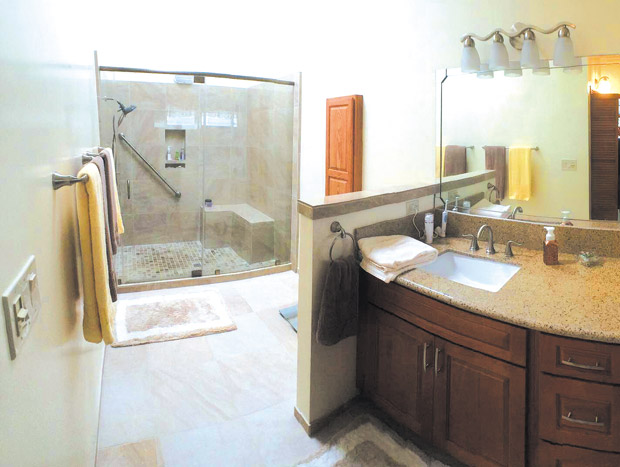By Gerry Peters
HPS Construction Services Ltd. makes it job one to keep pace with this amazing engineering evolution and advancement.
Showers used to have plain old, non-water resistant drywall behind the tile. Then water resistant “green or blue board” came in, followed by cement fiber type tile backer. These are water resistant but not waterproof.
Now there is even better: HPS uses three-layer, pre-sloped composites of two, thin layers of cement board with watertight dense foam in between. This enables HPS to use current drain locations with minimal adjustment, no matter if converting to a walk-in shower, or upgrading from an old shower. This advancement allows HPS to install built-in soap and shampoo niches, as well as corner benches or full-width, across-the-shower-floor benches.
To add to that major evolutionary improvement, today’s tile comes in many sizes, shapes, colors and special purpose use.
For shower floors, porcelain tile comes on mesh — often called netted tile. The mesh allows the floor to have a better coefficient of traction (for safety), and it installs with zero hassle along the slope lines.
But here’s what’s really new: never-stain, urethane-epoxy type grouts. It hardens like the tile itself with the molecules filling the pores of the grout, making it hard, and water and dirt resistant.
Bathroom Remodel Panels: Corian vs. Granite vs. Quartzite
For example instead of costly, major branded Corian, and Silestone, there now are available generic shower panels. They are full height, one for each end, and two for the long wall. They have hidden, miter type, special joints we prepare at our granite and quartzite panel shop. Colors are limited, but being added for these shower panels, and they are cost effective.
Gerry Peters is HPS President/General Manager.
HPS CONSTRUCTION
contact // 847-4400
web // hpsconstructionservices.com
See more articles from: HPS CONSTRUCTION SERVICES
